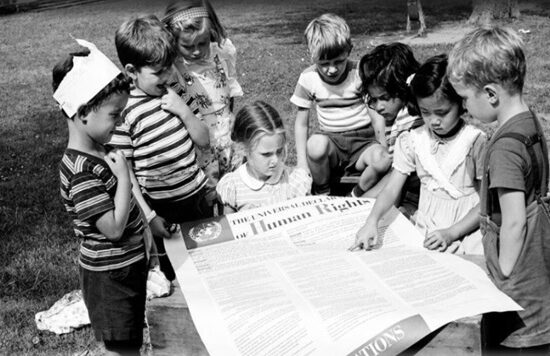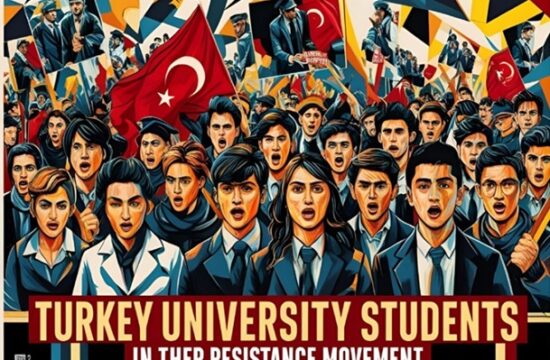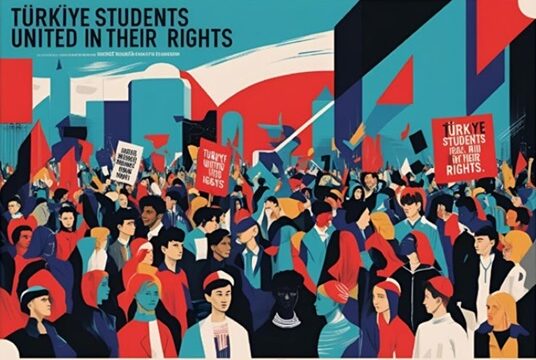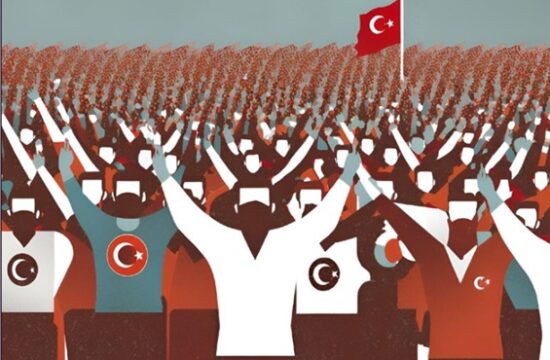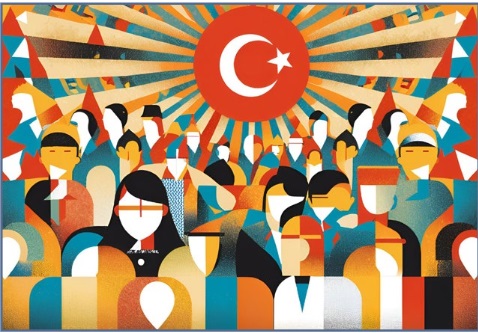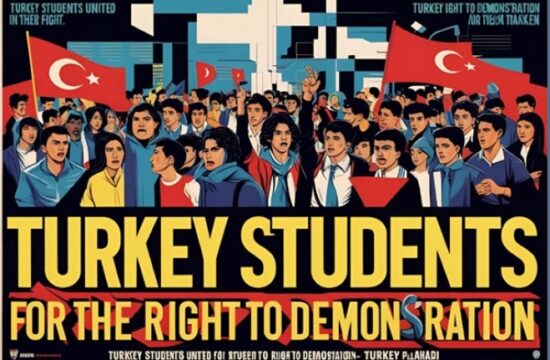Furkan
Middle East Technical University|ODTU
picture source: Created with AI
In the early hours of March 19, Türkiye was shaken by the arrest of a large number of people by the police in house raids as part of investigations into corruption and terrorism.
To begin with, it should be said that the materialization of this possibility, which was echoed by the national media months ago and on which newspapers close to the Government gauged the possible reaction with their publications, comes as a surprise to no one. The growing intensification of conflicts between cliques of the ruling and op-position wings and capitalist groups as a whole was a clear precursor of what was to come, as these tensions became more visible than usual.
When the country’s political situation reached favorable conditions for the government’s next step, what was to come became a reality. Nevertheless, with the steps taken by the government it has become clear that the comprehensive operation, which has been carried out in various forms for a long time in order to criminalize the political group at the center of which is İmamoğlu, a strong political figure, has not met with a positive response in public opinion.
In addition to the elimination by Erdoğan of the strongest rival that could oppose him in the elections, this move meant much more to sectors of the population: The AKP’s willful derogation of legality, the practical suspension of the right to elect and be elected, the belt-tightening under neoliberal economic policies, the labor regime deepening inequality and increasing poverty…
It was these conditions as a whole that turned March 19 into a major political breaking point for society as a whole and brought tens of thousands of citizens onto the streets; it was these conditions that rekindled the dynamic of struggle of young people who were looking for a way out of the dark panorama in which they found themselves worried about their future and that of their country.
Today, our country is further and further away from establishing even a minimum standard of living for students, as well as for all segments of the population that live directly or indirectly through their labor. In fact, nowadays, it is not possible to speak of any indication that we are observing a sensitivity towards the humanitarian construction of social life, but quite the contrary: In the fundamental contradiction, the capitalist class, which has no such obstacle as a politically conscious and organized working class, is transferring resources from the savings of the workers to its own class under the cover of the discourse of the economic crisis, which is considered a rhetorical element contradicted by the concrete data.
The existing regime of capital accumulation, which can realistically be described as a distributional shock, causes that the share of the pie, which has been growing over the years, becomes more unbalanced in the eyes of the classes as time goes by. The share of young people in this chart is, for this very reason, quite clear: Having to work at the same time as studying, the opening of university campuses to the market, the loss of value of titles, the lack of social and cultural activities? These circumstances are accompanied by a state of mind that despairs of the future, weakens ties with their coun- try and seeks a way out with possibilities of individual salvation by going abroad.
This portrayal of social life, which can be observed in the supra-structural elements with which the harsh labor regime is in dialectical relation, naturally creates examples that do not fit into this framework on behalf of those who oppose them. As recent social mobilizations have demonstrated most clearly, young people do not accept the life assigned to them.
It can be stated that young people, who were born during the AKP period and spent a significant part of their lives under the harsh conditions set by this government, have not witnessed a large-scale popular movement in the country, except for the Gezi Resistance, which corresponds to the childhood of these young people.
This generation of young people, today’s university students, had created examples of open expression of their reactions that sometimes went beyond the limits that had been set for them in recent years, when there was no social mobilization like the present one. The youth demonstrated their presence in the political arena and made their presence felt with mass protests against many scandals that did not go beyond the orderly construction of social life and were inherent to this framework, but which caused indignation in the eyes of the masses because of their eye-catching content.
The young people shocked by the loss of their friends of the same age and generation, who had common living conditions and common agendas, demonstrated by their energetic reactions that they could not be intimidated by callousness and that their feelings of social solidarity and struggle were alive and well – both for themselves and for others. However, in the last instance, it is important to note that these reactions in the past have not gone beyond the limited period of time in which they have occurred separately and individually on some campuses and in some urban centers.
The most critical point of distinction, in which today goes beyond yesterday, is that the reactions occurring in the various cities and campuses have a mutually reinforcing and enriching profile as they interact in different ways, thus bringing them closer to a visibly common plane beyond the basic motivations for action.
After years in which the existence and non-existence of the youth movement was a matter of debate, in which we can even point to the existence of this debate as evidence that there is no movement that can be described as a youth movement..
This shift in the character of the struggle of restless youth points not only to a quantitative difference in the way it mobilizes broad sectors of society, but also to a qualitative change that would not have been possible to talk about even a short time ago.
The quest of youth is today, as it was yesterday, a way out of the dark panorama of the absence of a future. Precisely at this point, it is essential to remember that capitalism, which represents a special regime of current political power, has at its disposal various tools aimed at young people, as well as at all segments of society, given the need to reproduce its own legitimacy in order to guarantee its continuity.
We cannot expect the capitalist class, operating with a developed class consciousness and internal organization, to clearly reveal the restricted framework it draws for youth, and it is obvious that they will take systematic measures against the emergence of alternative paths which have the potential to harm their own survival, and eventually the capitalist system will replace such alternatives with options that pose no real danger to it.
Even if they do not offer a real solution, the exit route sought by young people can sometimes coincide with these artificial alternatives, as they are successful replicas difficult to recognize. For example, the liberal narrative, which denies the material conditions of the human being, attributes the difficulty to the insufficiency of one’s own will and thus makes the individual absorb his or her essentially justified reaction by turning it against him or herself, this constitutes one of these vortexes disguised as an exit.
This ideological argument, which nowadays more easily finds the practice it needs with the opening of campuses to the market, turns students into creatures driven by dreams of individual salvation, who consume the dynamism of youth with career societies, and who consider chasing the company in which they want to do an internship a worthy attitude, as a result of which students and youth are rendered meaningless. The desire to leave the country and the dream of living abroad arise from a similar background. Although it is not the subject of this article, it should be noted that the social democracy also functions as a tool within this sphere in the political-ideological field.
It is evident that young people today, compared to the past, are distrustful and distant from such alternatives, and one of the most critical consequences of the recent mobilization is this shift in framework.
Regardless of all the question marks, it can be stated that the new position, despite all the uncertainties in mind, contains a strong tendency of young people to equate their own destiny with the destiny of the country and to put it in common. The reflex to show the will to act on this common future, that does not remain only at the level of observation, is the basic signal of the series of actions that constitute the object of this article.
It is possible to affirm that there are no sharp ideological distinctions in terms of the political character of the mobilized youth, in this context, issues that are on the agenda of the media, such as the fact that nationalist and socialist youth march together, can be explained by the transitivity in the quest and character that we have mentioned. It can be seen that the points separating politically and ideologically groups of different positionings are treated rather superficially by young people. If we look at the last few years, in which the conditions for participation in politics have weakened and disorganization has become a distinguishing feature, we should not be surprised by this panorama in which it is not clear who is defending what and for what.
A strong reaction, confusion about how to express this reaction, openness to participation in social organizations and an exhaustive quest, the results of which will only be seen with time..
Today, the existence of the quest and, of course, where it leads is decisive: The demand for equality in the face of unequal distribution, the demand for freedom, which can be considered the hallmark of the youth movement because of its dynamics, secularism in the face of the design of the public sphere with religious elements, the republic symbolized by the founding values of the country, independence with a true patriotic resistance to accusations of having roots abroad…. It obviously transmits positive vibes for the future.
It is of utmost importance that university students strengthen the tendency to express their opinions about politics, about the conditions that determine their future and that of their ountry, and to act as a practical response to these opinions, in conditions where political power has for many years systematically prevented the participation of the people in politics. The determining factor in the future will be how these networks will be reconstructed by young people who meet on campuses and faculties, discuss and make decisions together, enforce these decisions together and see their effects from time to time, hence becoming subjective.
Eventually, the political rupture became a symbol of the long-accumulated anger and quest of the youth, which overflowed into the streets. It has triggered an awakening that cannot be quickly and easily quelled. It has become a practice of subjectivization of a generation, which the government was trying to intimidate and which many looked down upon, through the deployment of a collective will against the lack of future imposed on them.
t is possible to keep this new area alive and political, buzzing with youth, even if the fervor in the streets ceases, through the various channels that are created. It is hopeful that the framework in which it is intended to provide an answer to the quest also includes references to an independent left-wing option, in the sense of providing a basis for the existing will to form a real demand for equality and freedom.
Finally… I would like to salute; ODTU, which has been one of the symbols of youth dynamics turning its face to the light since its foundation, Istanbul University, which brought back to the youth the optimism of the will with the police barricade that destroyed the first day, and all my high school and university students who have shown that they are not content with the fate that has been imposed on them throughout our country, and who have given us all hope for the future, with my unshakable conviction that we will definitely take our future into our own hands.



